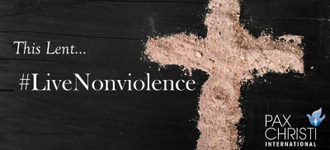Pax Christi Reflection for Third Sunday of Lent: Second breath, a call to take responsibility

Calling out in the desert. We all know that feeling. No one hears; no one listens. When we do get a response, we find a second breath. With that second breath, we can call again, re-engage and re-believe. We hear that Moses finds a second breath after God calls him from the burning bush. In addition, we read that the vinedresser finds a second breath and commits himself to the up-to-now barren fig tree.
Members of justice and peace groups and social organisations need a long-term commitment, a second breath, to engage themselves permanently. A second breath that God always gives.
In everything that happens, we consistently look for the responsibility of others and we look less critically at our own share. If we want to build a better, peaceful, more just future, then each of us must take responsibility. Making mistakes is very human. You can correct errors (or have them repaired). But not taking responsibility or even turning the blame on to someone else is bad and a shame.
Moses cannot but accept his responsibility. He knows that his people live in slavery in Egypt; it does not let him go. In the burning bush, he hears the God of Abraham, Isaac and Jacob: "I have seen the misery of my people. I know their suffering. I come to liberate my people." Moses calls for the name of this God. But this is a God who cannot be captured in words and pictures. Moses must do with: "I am who I am."
The gospel does not evade responsibility. Jesus tells the parable of the fig tree, a metaphor for the city of Jerusalem. The fig tree produces no fruits; Jerusalem is corrupt, playing the game of the powerful nations around it and not a city of peace. Jesus is strict, pointing out the bad situation, but leaves an opening for a new beginning. This way the fig tree gets a second chance and Jerusalem a second breath.
Every Sunday of this Lenten time, the theme of the Exodus returns, a symbol of every road that leads from slavery to liberation, from injustice to justice, from violence to nonviolence. The temptations are not lacking on this route. In spite of God's constant care, the Israelites succumb and die in the desert. Christians are also not immune to the dangers of evil. Contemporary forms of evil are poverty, hunger, exclusion, violence, underdevelopment, discrimination, racism and more.
Christians should continuously inspire and encourage each other to safeguard human dignity, both in human growth and in human suffering and dying. Reciprocal love shall be humanity's culture. This requires continuous nourishment and 'resourcing', looking for and giving purpose from a Biblical tradition. The gospel asks us to regularly test and explain the signs of the time. What is currently taking place in the world and what is its deeper meaning? Forever daring to ask the question: what is our society today like and what must be done to communally turn all people in this society into better people?
The never-ending effort of people to live together with others and to form a true society means that one person's good life contributes to someone else's good life too. Helping one another is essential to this process. Among other things, it is about care, well-being, charity, compassion, solidarity and assistance toward each other.
Sometimes it goes beyond that and one has the duty to help people in need, even those 'unknown people' who are in need. This then often leads to dilemmas: where lie the boundaries of human or individual responsibility and where begins the state's responsibility? Dilemmas are not negative or threatening; rather they make life interesting.
Volunteer work is like yeast in the dough
Pax Christi International is essentially a peace movement of volunteers. The "acte gratuity" may be understood as an essential component in social commitment, soliciting reciprocity, commitment, generosity and responsibility. Peace workers always need a second breath. After all peace work is an unfinished agenda, unfortunately enough. Their persuasion and taking responsibility make them agents of change - an effort in line with the Biblical image of "yeast in the dough."
Working for justice and peace is done in the understanding that the human being is not a solitary being but a social being and that his or her integral development primarily needs relations to fulfill his or her destiny.
Building peace is not solely something done for and through 'professionals'. Working on peace is everyone's responsibility. Peace is every person's calling. That is why we ask 'all people of good will' to cooperate. The communal frame is the need for a peaceful and just life. Every person and population group has the right to peace and security. I am sure, convinced, that I will only feel safe and well when others share that feeling. Christian peace work offers a platform where people can meet and communicate and, importantly, eliminate potential disagreements.
It is a virtue to bring people together. A good society is characterised by a fruitful tension between space for difference and the search for what we hold in common. The political community is thus at the service of the human community. That requires social pluralism, so a diversity of goods can be shown to its full advantage.
The justice and peace sector not only needs many professionals but also needs many who continue to live from a necessary urgency to seek and give meaning in life.
Again, we are invited to live through this Lenten season of faith, reconciliation, generosity and service, culminating in the Easter mystery. This season is meant to bear fruit in our lives.















